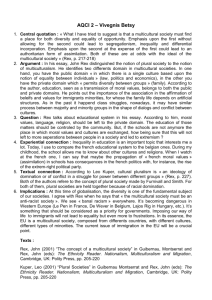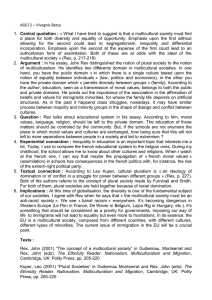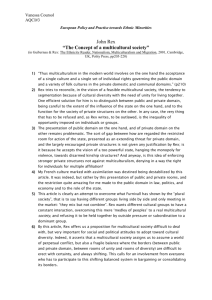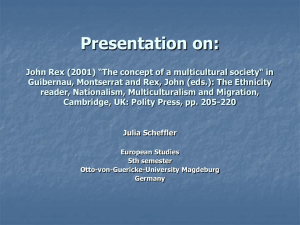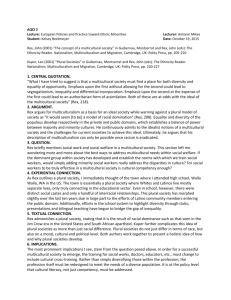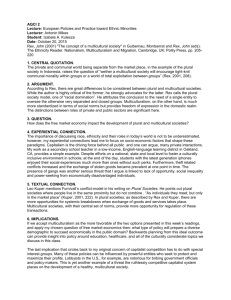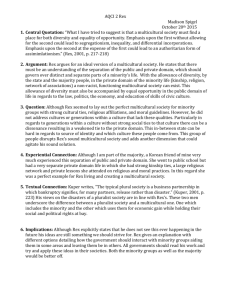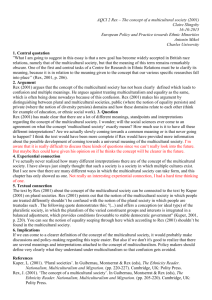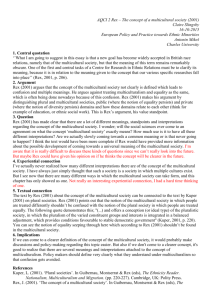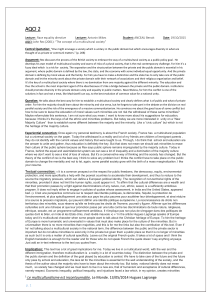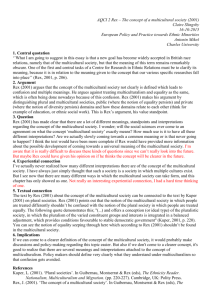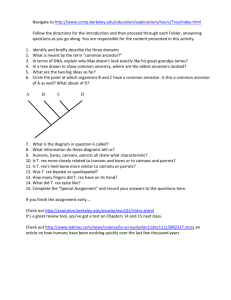Rex AQCI 2 Lara Belliot
advertisement
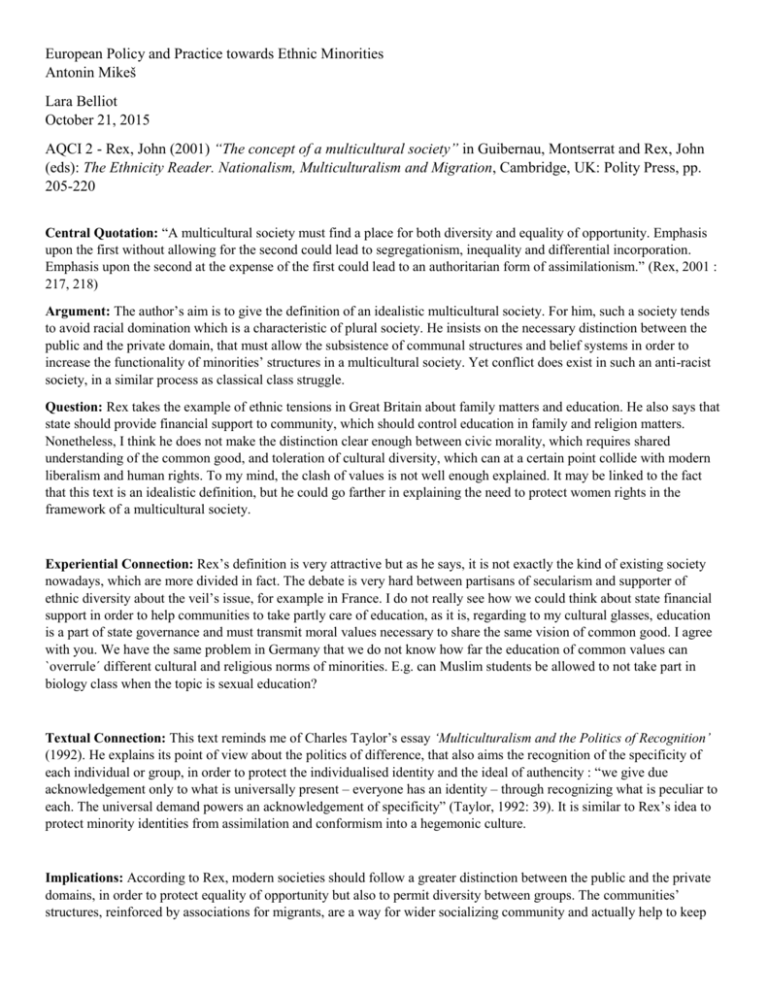
European Policy and Practice towards Ethnic Minorities Antonin Mikeš Lara Belliot October 21, 2015 AQCI 2 - Rex, John (2001) “The concept of a multicultural society” in Guibernau, Montserrat and Rex, John (eds): The Ethnicity Reader. Nationalism, Multiculturalism and Migration, Cambridge, UK: Polity Press, pp. 205-220 Central Quotation: “A multicultural society must find a place for both diversity and equality of opportunity. Emphasis upon the first without allowing for the second could lead to segregationism, inequality and differential incorporation. Emphasis upon the second at the expense of the first could lead to an authoritarian form of assimilationism.” (Rex, 2001 : 217, 218) Argument: The author’s aim is to give the definition of an idealistic multicultural society. For him, such a society tends to avoid racial domination which is a characteristic of plural society. He insists on the necessary distinction between the public and the private domain, that must allow the subsistence of communal structures and belief systems in order to increase the functionality of minorities’ structures in a multicultural society. Yet conflict does exist in such an anti-racist society, in a similar process as classical class struggle. Question: Rex takes the example of ethnic tensions in Great Britain about family matters and education. He also says that state should provide financial support to community, which should control education in family and religion matters. Nonetheless, I think he does not make the distinction clear enough between civic morality, which requires shared understanding of the common good, and toleration of cultural diversity, which can at a certain point collide with modern liberalism and human rights. To my mind, the clash of values is not well enough explained. It may be linked to the fact that this text is an idealistic definition, but he could go farther in explaining the need to protect women rights in the framework of a multicultural society. Experiential Connection: Rex’s definition is very attractive but as he says, it is not exactly the kind of existing society nowadays, which are more divided in fact. The debate is very hard between partisans of secularism and supporter of ethnic diversity about the veil’s issue, for example in France. I do not really see how we could think about state financial support in order to help communities to take partly care of education, as it is, regarding to my cultural glasses, education is a part of state governance and must transmit moral values necessary to share the same vision of common good. I agree with you. We have the same problem in Germany that we do not know how far the education of common values can `overrule´ different cultural and religious norms of minorities. E.g. can Muslim students be allowed to not take part in biology class when the topic is sexual education? Textual Connection: This text reminds me of Charles Taylor’s essay ‘Multiculturalism and the Politics of Recognition’ (1992). He explains its point of view about the politics of difference, that also aims the recognition of the specificity of each individual or group, in order to protect the individualised identity and the ideal of authencity : “we give due acknowledgement only to what is universally present – everyone has an identity – through recognizing what is peculiar to each. The universal demand powers an acknowledgement of specificity” (Taylor, 1992: 39). It is similar to Rex’s idea to protect minority identities from assimilation and conformism into a hegemonic culture. Implications: According to Rex, modern societies should follow a greater distinction between the public and the private domains, in order to protect equality of opportunity but also to permit diversity between groups. The communities’ structures, reinforced by associations for migrants, are a way for wider socializing community and actually help to keep one’s identity. This could help to increase political participation of communities and then to avoid creating separated communities living in the same country. Sample Self assessment form Department of Public and Social Policy, Faculty of Social Sciences, Charles University AQCI ASSESSMENT FORM Student’s name: Name of assessor: Helene Fritzsche Date: 20.10.2015 Essay title: Excel lent 1) Is the chosen quotation central to the author’s argument? Go od Aver age xx x Not accept able Comments I think the quote does represent the central argument x 2) Has the main argument been fully understood (including its ‘for’ and ‘against’ sides, if applicable)? 3a) Is the question raised important/relevant/interesting? 3b) Has this question not been fully answered in the text? Po or The argument is very well presented and shows clear understanding of Rex´ implications x x I think it is definitely interesting but I think a direct question would be nice x x See comment in the text xx 4) Is the experiential connection relevant/interesting? xx 5a) Is the textual connection relevant/interesting? 5b) Has it been cited properly? xx 5c) Has it been adequately explained how the present text's argument contrasts with, contradicts, confirms, clarifies, or elaborates the other text's argument or point? I like the use of in-text references to support your statements xx x 6) Have the implications been well understood, can they have a practical impact for policy making? 7) Expression/Presentation a) Are the style, grammar and general use of English adequate? b) Is the AQCI professionally presented? Essay grade: xx x x x Further comments:
